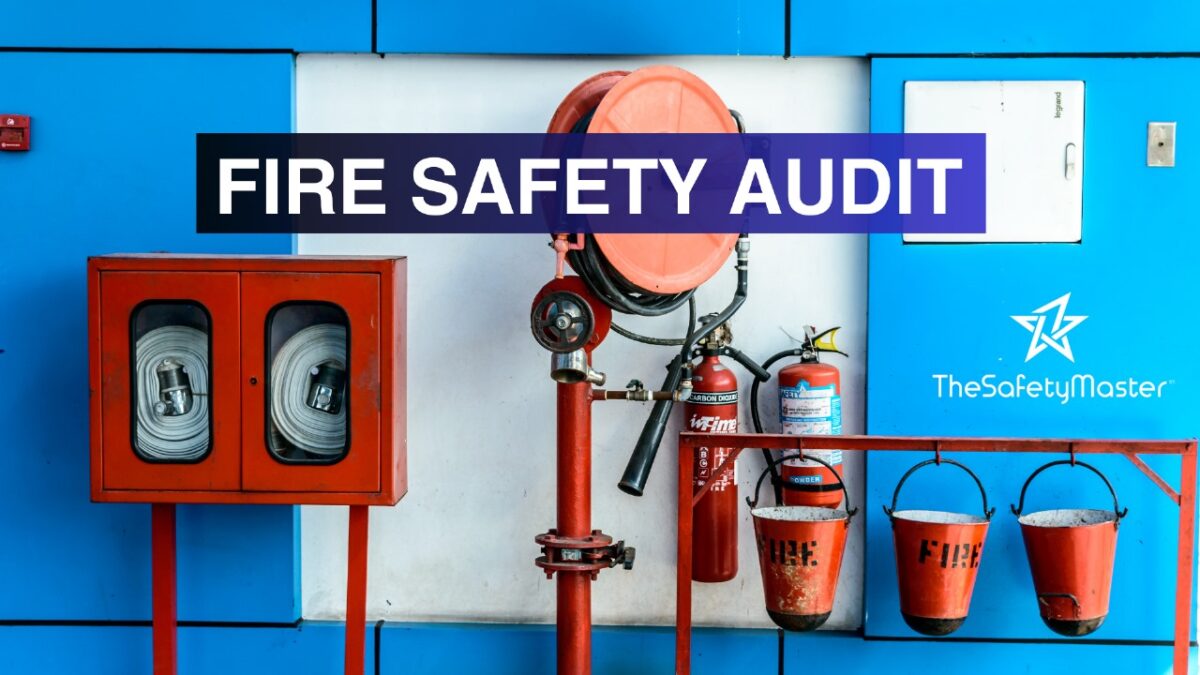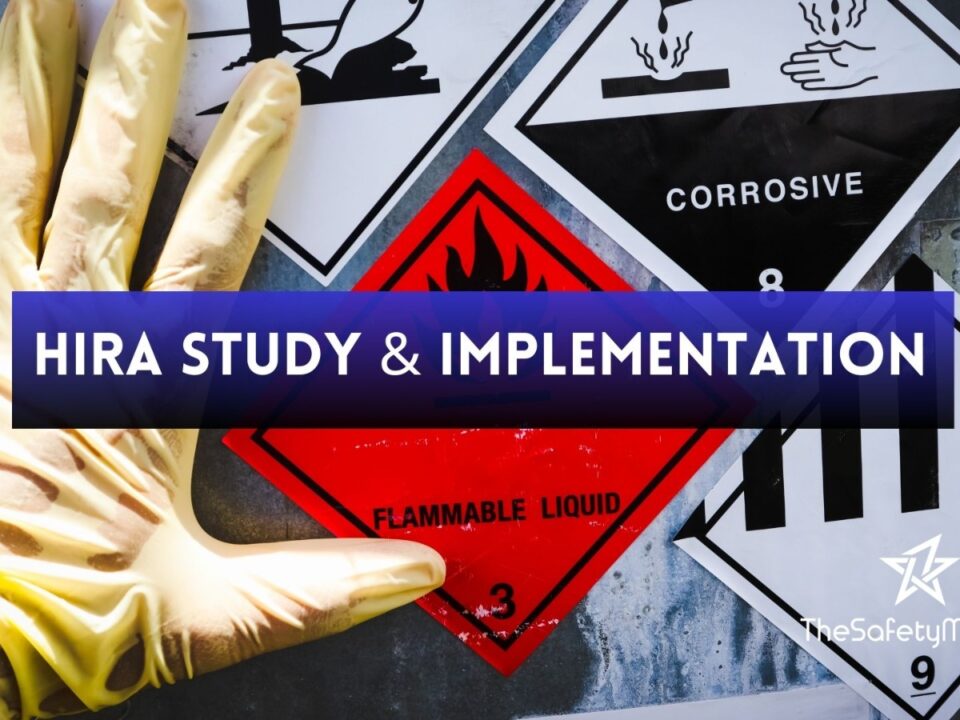Fire Safety Audit: Ensuring Compliance and Preventing Catastrophes in Indian Industries
Machine Guarding Assessment: Protecting Employees and Boosting Productivity in Indian Manufacturing
October 23, 2023
Scaffolding Safety Training: A Proactive Approach Towards Employee Protection in Indian Industries
October 26, 2023In this article, we delve into a critical aspect that can make or break the safety standards within Indian industries – the fire safety audit. Neglecting this crucial procedure can expose companies to a multitude of risks, including catastrophic incidents that could potentially jeopardize lives and businesses. By exploring the importance of fire safety audits, we aim to enlighten our readers on the significance of compliance and prevention in safeguarding against potential disasters. So, stay tuned as we discuss the key factors to expect in an audit, providing insights that ensure a safer and more secure future for Indian industries. Shop for peace of mind, as we guarantee this article will equip you with the essential knowledge you seek to enhance fire safety practices within your organization. Now, let’s dive in.
Introduction
Life is unpredictable, and so are the potential hazards that can jeopardize our safety. In the realm of industrial settings, one such hazard looms ominously – fire. Fires in industries can lead to devastating consequences, causing loss of life, property damage, and significant financial setbacks. To prevent such catastrophes and ensure the safety of workers and assets, fire safety audits have emerged as a crucial component in Indian industries. In this enlightening article, we will dive into the world of fire safety audits in Indian industries. We will explore the importance of these audits in complying with regulations and preventing disasters. Additionally, we’ll examine the key elements involved in conducting a thorough fire safety audit, ranging from assessing risks to evaluating equipment and systems. By understanding the significance of fire safety audits, readers will gain valuable insights into safeguarding their workplace against potential fires
Understanding the Importance of Fire Safety Audits
Understanding the Importance of Fire Safety Audits: In today’s fast-paced industrial landscape, where innovation and productivity take center stage, it is crucial not to overlook the significance of fire safety audits. These comprehensive assessments serve as a critical tool in preventing potential catastrophes and protecting lives, property, and the integrity of Indian industries. A fire safety audit entails a systematic evaluation of an organization’s fire safety measures, protocols, equipment, and training to ensure compliance with legal requirements and best practices.
By undertaking regular fire safety audits, industries demonstrate their commitment to safeguarding their workforce and assets. These audits provide a holistic understanding of existing fire safety measures while identifying potential risks and vulnerabilities. From assessing emergency evacuation plans to evaluating the functionality of fire detection systems, each aspect is scrutinized meticulously to ensure optimal preparedness in the event of a fire outbreak. By investing time and resources into these audits, industries can proactively address any shortcomings or deficiencies in their fire safety procedures.
Emphasizing the importance of fire safety audits not only encourages compliance but also fosters a culture of safety within Indian industries. Such proactive measures create an environment where employees feel valued and protected in their workplace. Ultimately, this contributes to increased morale and productivity while instilling confidence among stakeholders that every possible measure has been taken to prevent disasters effectively. Adopting a positive approach towards fire safety audits ensures that businesses stay on top of evolving regulations while reinforcing their commitment towards creating safer work environments for one and all.
Fire Safety Laws and Regulations in Indian Industries
Fire Safety Laws and Regulations in Indian Industries: In the realm of fire safety, Indian industries are governed by a comprehensive framework of laws and regulations that aim to safeguard lives, property, and the environment. The legal framework is primarily overseen by the National Building Code of India (NBC), which provides guidelines for fire prevention, protection, and mitigation measures. Additionally, the Occupational Safety and Health Act (OSHA) governs workplace safety standards pertaining to fire hazards.
Under these laws, various aspects are covered such as fire-resistant construction materials, proper spacing between buildings to prevent rapid spread of fire, installation and maintenance of fire detection systems, availability of adequate firefighting equipment and trained personnel. Industries are also obligated to conduct regular fire drills and maintain records for compliance purposes.
These regulations serve as a crucial safeguard against potential catastrophes by establishing stringent standards that industrial entities must adhere to. By ensuring strict compliance with these laws, organizations can create an environment where employees feel safe and secure while protecting valuable assets. Consequently, adherence to these regulations not only prevents tragedies but also fosters a culture of preparedness within Indian industries.
Key Elements of a Fire Safety Audit
A fire safety audit is an essential tool to ensure the protection of life and property in Indian industries. It comprises several key elements that work together to create a comprehensive evaluation of fire safety preparedness. 1. Fire Safety Management System Evaluation: This element focuses on assessing the overall effectiveness of the fire safety management system in place. It involves reviewing policies, procedures, and protocols related to fire prevention, emergency response, evacuation plans, and communication strategies. By evaluating these aspects, organizations can identify any gaps or areas that require improvement.
2. Hazard Identification and Risk Assessment: This element entails a meticulous examination of potential fire hazards within the industrial premises. It includes identifying flammable materials, electrical risks, storage practices, and other factors that may contribute to fires. Conducting a thorough risk assessment allows organizations to prioritize their mitigation efforts and implement necessary control measures.
3. Inspection of Fire Safety Equipment: This element concentrates on inspecting all fire safety equipment installed on-site, such as extinguishers, sprinkler systems, smoke detectors, alarms, and emergency lighting systems. The aim is to ensure that all equipment is properly maintained and functional at all times so that they effectively respond in case of a fire emergency.
By considering these key elements during a fire safety audit, Indian industries can proactively address potential risks and enhance their preparedness for unforeseen events. Such audits not only safeguard lives but also foster peace of mind for employees and stakeholders alike while promoting a culture of safety within organizations
Assessing the Fire Safety Preparedness: Identifying Risks and Vulnerabilities
Assessing the Fire Safety Preparedness: Identifying Risks and Vulnerabilities Within the realm of fire safety audits, assessing the fire safety preparedness of Indian industries is paramount. It involves a meticulous examination of potential risks and vulnerabilities that might compromise the safety of personnel and property. By scrutinizing various factors, such as the layout and construction of buildings, electrical systems, storage practices, and potential ignition sources, auditors can identify potential hazards that could lead to catastrophic events.
This process necessitates a comprehensive analysis to ensure no stone is left unturned. Auditors meticulously inspect fire exits to assess their accessibility and adequacy for swift evacuation. They also evaluate the effectiveness of fire suppression systems like extinguishers, sprinklers, and hydrants in combating potential fires. Additionally, they critically examine ventilation systems to ensure proper smoke management in case of emergencies.
By conducting these assessments with utmost precision, auditors help industries recognize their weak points while providing valuable recommendations for improvement. This proactive approach enables businesses to prioritize investments in robust fire prevention measures, mitigating risks effectively and instilling a sense of security among employees. Ultimately, through meticulous risk identification and vulnerability assessment, industries can significantly reduce the likelihood of disasters while fostering safer work environments for all stakeholders involved.
Evaluating Fire Safety Equipment and Systems
Evaluating Fire Safety Equipment and Systems: Ensuring the effectiveness of fire safety equipment and systems is paramount in preventing catastrophes in Indian industries. During a comprehensive fire safety audit, experts meticulously evaluate the condition and functionality of various firefighting tools, such as fire extinguishers, fire alarms, sprinkler systems, smoke detectors, and emergency lighting. They scrutinize installation practices to ensure compliance with industry standards and regulations.
Fire safety auditors also examine the maintenance records of these equipment and systems to verify if regular inspections, testing, and servicing have been carried out diligently. This evaluation helps identify any potential issues or deficiencies that may compromise the functionality of the equipment during emergencies. By thoroughly assessing fire safety equipment and systems within Indian industries, we can instil confidence in employees’ safety while fostering a proactive approach towards minimizing risks.
Fire Safety Training: Ensuring Proper Knowledge and Response
Fire Safety Training: Ensuring Proper Knowledge and Response in the realm of fire safety, knowledge and preparedness are paramount. Fire safety training plays a crucial role in equipping employees with the necessary skills to prevent fires and respond effectively in case of an emergency. This section delves into the importance of comprehensive fire safety training programs tailored to Indian industries.
A thought-provoking content: Imagine a scenario where every employee in an industrial setting possesses the expertise to swiftly identify potential fire hazards, safely operate firefighting equipment, and execute well-rehearsed evacuation plans. By investing in robust fire safety training, companies not only ensure compliance but also foster a culture of safety, empowering individuals to be proactive guardians against potential catastrophes.
To achieve this level of preparedness, fire safety training programs encompass various aspects. They educate employees on fire behaviour, types of extinguishers suitable for different fires (such as Class A, B, C), usage techniques for fire suppression systems (including sprinklers), and relevant evacuation procedures tailored to industry-specific requirements. Additionally, trainees are equipped with first aid knowledge to provide immediate assistance if someone sustains injuries during a fire incident.
By fostering a well-trained workforce that understands the intricacies of preventing fires and responding swiftly when necessary, Indian industries can significantly reduce the risks associated with fires. Such preparedness not only protects lives but also safeguards valuable assets and ensures business continuity even in challenging circumstances. Ultimately, comprehensive fire safety training empowers individuals with the tools they need to become active participants in creating safer work environments.
Emergency Preparedness and Response Plan: A Crucial Component of Fire Safety
Every industry, regardless of its size or nature, must prioritize emergency preparedness and response in the face of fire incidents. An effective Emergency Preparedness and Response Plan is a crucial component of fire safety in Indian industries. This plan outlines the necessary procedures, protocols, and resources required to handle emergencies promptly and efficiently. In developing an Emergency Preparedness and Response Plan, it is essential to conduct a thorough risk assessment specific to the industry’s operations and location. Identifying potential fire hazards, evaluating their severity, and understanding their possible consequences is vital for devising appropriate response strategies. Additionally, considering the unique aspects of each industrial setting ensures that the plan is tailored to address site-specific risks.
The plan should encompass clear guidelines for evacuation procedures, communication protocols during emergencies, designated assembly points for personnel, and emergency contact information. It should also outline roles and responsibilities for employees during a crisis situation. Regular drills and training sessions based on this plan will help ensure that employees are well-prepared to respond effectively in potentially dangerous situations.
By having a comprehensive Emergency Preparedness and Response Plan in place, Indian industries can instil confidence among their workforce while demonstrating their commitment to safety. Such proactive measures not only safeguard lives but also minimize property damage in case of fire incidents. Ultimately, fostering a culture of preparedness promotes a sense of security within the industry while contributing to overall productivity and success.
Conducting Fire Safety Inspections: Regular Monitoring and Maintenance
Conducting Fire Safety Inspections: Regular Monitoring and Maintenance Once a fire safety audit is conducted and the necessary measures are put in place, it is crucial to ensure that regular inspections are carried out to maintain fire safety standards. These inspections serve as a proactive approach to identify any potential risks or vulnerabilities that may have developed over time.
During these inspections, trained professionals thoroughly examine the entire facility, paying close attention to fire prevention systems such as fire alarms, sprinkler systems, extinguishers, and emergency exit routes. They assess whether these systems are functioning optimally and whether any repairs or replacements are required. Furthermore, they inspect electrical wiring and other potential fire hazards within the premises.
Regular monitoring and maintenance not only help prevent catastrophic fires but also instil a sense of security among employees and stakeholders. It demonstrates an organization’s commitment to prioritizing their safety and well-being. By actively investing in fire safety inspections, companies can create a positive work environment that fosters trust and confidence while minimizing the risk of devastating incidents.
Compliance and Recordkeeping: Documentation and Reporting
Compliance and Recordkeeping: Documentation and Reporting in the realm of fire safety audits, meticulous documentation and reporting play a pivotal role. Indian industries must adhere to a comprehensive system of recordkeeping to ensure compliance with fire safety regulations. This entails maintaining detailed records of all fire safety measures, inspections, equipment maintenance, training sessions, and emergency drills conducted within the premises.
Proper documentation not only serves as evidence of compliance but also enables businesses to track their progress in enhancing fire safety preparedness over time. Furthermore, it provides a foundation for analysing trends, identifying areas for improvement, and implementing corrective measures. By systematically documenting their efforts to mitigate fire risks, industries can demonstrate their commitment to ensuring the safety of employees and visitors alike.
Reporting is another crucial aspect that cannot be overlooked. Indian industries must submit periodic reports to relevant authorities detailing their compliance with fire safety regulations. These reports provide an opportunity for businesses to showcase their dedication towards creating a safe environment while fostering transparency within the industry as a whole. Through accurate reporting, industries contribute towards building trust and establishing higher standards in fire safety management across the country.
By diligently practicing documentation and reporting procedures related to fire safety audits, Indian industries not only fulfil legal obligations but also pave the way for continual improvement in preventing potential catastrophes. With each report submitted and every piece of documentation recorded, they contribute towards creating a safer future for all stakeholders involved in industrial operations
Addressing Non-Compliance and Corrective Measures
Addressing Non-Compliance and Corrective Measures: Failing to comply with fire safety regulations can have severe consequences, potentially leading to catastrophic incidents. However, addressing non-compliance and implementing corrective measures can greatly mitigate risks. When non-compliance is identified during a fire safety audit, swift action must be taken to rectify the issues.
One approach is to conduct a comprehensive analysis of the specific areas where non-compliance has been observed. This involves identifying the root causes of the non-compliant practices or deficiencies in fire safety measures. By understanding these underlying factors, targeted corrective measures can be implemented to address them effectively.
Corrective measures may include upgrading or replacing outdated fire safety equipment, improving infrastructure to meet regulatory standards, enhancing training programs for employees, or revising emergency response protocols. Additionally, regular monitoring and inspections should be conducted to ensure sustained compliance over time.
By actively addressing non-compliance and implementing appropriate corrective measures promptly, businesses not only demonstrate their commitment towards ensuring a safe workplace but also protect their employees and assets from potential disasters. Embracing a proactive approach not only guarantees compliance but also fosters a culture of safety and well-being within Indian industries.
Benefits of Fire Safety Audits for Indian Industries:
Fire safety audits play a crucial role in ensuring the safety and well-being of Indian industries. By conducting regular audits, companies can identify potential fire hazards and take proactive measures to mitigate risks. This not only protects the lives of employees but also safeguards valuable assets, preventing catastrophic losses. One significant benefit of fire safety audits is improved compliance with regulations and standards. By adhering to the guidelines set by authorities, companies can avoid hefty fines and legal troubles. Moreover, maintaining a good compliance record enhances the reputation of the organization, instilling confidence in stakeholders, clients, and investors.
Additionally, fire safety audits promote a culture of preparedness within industries. Through these assessments, companies can identify gaps in their emergency response plans and make necessary improvements. Proper training programs can be implemented to educate employees on evacuation procedures and efficient utilization of firefighting equipment. This increased preparedness not only protects individuals during emergencies but also minimizes the damage caused by fires if they do occur.
In conclusion, investing in fire safety audits is a wise decision for Indian industries as it ensures compliance with regulations while proactively addressing potential risks. These audits create a safe working environment for employees while protecting valuable assets. By embracing comprehensive fire safety measures through regular assessments, industries demonstrate their commitment towards employee welfare and contribute to building a safer society as a whole.
Conclusion
In conclusion, it is evident that fire safety audits play a pivotal role in ensuring compliance and averting potential catastrophes in Indian industries. By meticulously assessing risks, evaluating equipment and systems, and providing comprehensive training, these audits serve as a powerful tool in safeguarding lives, property, and the overall well-being of businesses. As fire safety becomes an increasingly vital aspect of industrial operations, embracing proactive measures through regular inspections and maintaining compliance will undoubtedly instil a sense of security and foster a culture of safety within the industry. Remember, prevention is key, and taking the necessary steps to mitigate fire hazards not only demonstrates responsible practices but also contributes to the sustainable growth of our nation’s industries.



